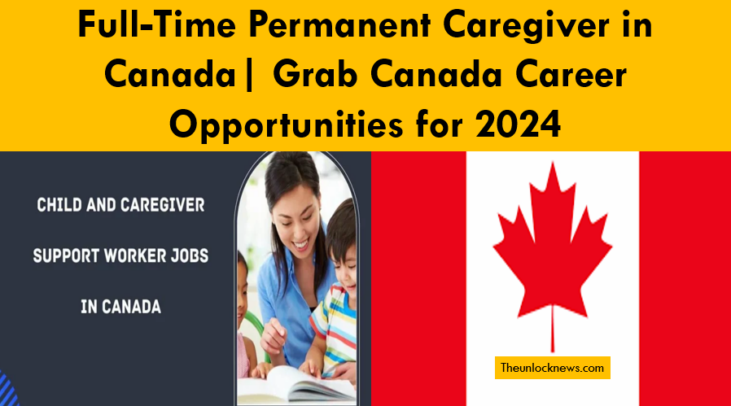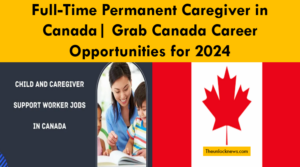
Understanding the Role of a Full-Time Permanent Caregiver in Canada
A full-time permanent caregiver in Canada plays a crucial role in providing essential care and support to individuals in need, such as children, elderly individuals, or those with disabilities. They are responsible for assisting with daily activities, including personal hygiene, meal preparation, medication administration, and emotional support. Furthermore, full-time permanent caregivers are expected to create a safe and nurturing environment for their clients, promoting their overall well-being and quality of life. Their dedication and commitment help to improve the lives of those they care for, making this role critical in the Canadian healthcare system.
Definition and Responsibilities of a Full-Time Permanent Caregiver
A full-time permanent caregiver in Canada is an individual who provides comprehensive care and support to individuals in need. Their role involves assisting with daily activities, such as personal hygiene, meal preparation, medication administration, and emotional support. They create a safe and nurturing environment for their clients and promote their overall well-being and quality of life. Full-time permanent caregivers play a crucial role in the Canadian healthcare system, improving the lives of those they care for and ensuring they receive the necessary support to lead fulfilling lives. Full-Time Permanent Caregiver in Canada
Benefits and Challenges of Being a Full-Time Permanent Caregiver
Being a full-time permanent caregiver in Canada comes with its own set of benefits and challenges. On one hand, caregivers have the opportunity to make a positive impact on individuals’ lives and contribute to their overall well-being. They have the satisfaction of knowing that they are providing much-needed support and care to those in need. Additionally, being a caregiver can also provide a sense of fulfillment and personal growth. Full-Time Permanent Caregiver in Canada
On the other hand, being a full-time permanent caregiver can be physically and emotionally demanding. Caregivers may have to work long hours and handle multiple responsibilities simultaneously. They may also face challenges in managing their self-care while prioritizing the needs of their clients. Emotional stress and burnout are common among caregivers. Despite the challenges, caregivers play a vital role in society, and their work is invaluable in ensuring the well-being of those they care for.
Full-Time Permanent Caregiver in Canada Full-Time Permanent Caregiver in Canada
Qualifications and Requirements for Full-Time Permanent Caregivers in Canada
To become a full-time permanent caregiver in Canada, certain qualifications and requirements need to be met. Typically, a high school diploma or equivalent is the minimum educational requirement. However, additional certifications or training in areas such as first aid, CPR, or specialized care may also be required depending on the specific role.
In terms of work experience, previous experience in caregiving or related fields can be beneficial. Strong communication and interpersonal skills are essential, as caregivers need to effectively communicate with both their clients and their clients’ families. Additionally, caregivers must be physically fit and able to meet the demands of the role, as it may involve lifting or assisting with personal care tasks. Full-Time Permanent Caregiver in Canada
Educational Background and Training Needed
To become a full-time permanent caregiver in Canada, a high school diploma or equivalent is typically required. However, additional certifications or training in areas such as first aid, CPR, or specialized care may also be necessary, depending on the specific role. These additional qualifications can help caregivers deliver high-quality care to their clients. Additionally, ongoing education and professional development courses may be required to stay updated with the latest practices and advancements in the caregiving field. Continuous learning and acquiring new skills are essential for caregivers to provide the best possible care to their clients. Full-Time Permanent Caregiver in Canada
Work Experience and Skills Required
To qualify for a full-time permanent caregiver role in Canada, relevant work experience is highly valued. Employers often seek candidates with a proven track record of providing compassionate care and support to clients. Previous experience in a similar caregiving role, such as working in a healthcare or home care setting, can demonstrate the candidate’s ability to handle the responsibilities and challenges of the job. Additionally, possessing essential skills such as communication, empathy, and problem-solving is crucial for building strong relationships with clients and providing quality care. Regularly updating skills and knowledge through continuous education and training can also enhance job prospects in this field.
Full-Time Permanent Caregiver in Canada Full-Time Permanent Caregiver in Canada
Finding Employment as a Full-Time Permanent Caregiver in Canada
Finding employment as a full-time permanent caregiver in Canada can be facilitated through various strategies and resources. Job seekers can explore online job portals, professional networks, and caregiver-specific platforms to find relevant job opportunities. It is essential to create a well-crafted resume highlighting relevant skills, qualifications, and experience. Networking events, career fairs, and industry-specific workshops can also provide avenues for connecting with potential employers and learning about job openings. Seeking guidance from employment agencies and utilizing government resources, such as the Job Bank and Employment Insurance, can further enhance the job search process.
Job Search Strategies and Resources
When searching for employment as a full-time permanent caregiver in Canada, job seekers can utilize various strategies and resources to increase their chances of finding suitable positions. Some effective job search strategies include: Full-Time Permanent Caregiver in Canada
- Online job portals: Websites such as Indeed, Monster, and Care.com offer a wide range of caregiver job postings.
- Professional networks: Networking with other caregivers, healthcare professionals, and industry-specific groups can provide valuable job leads.
- Caregiver-specific platforms: Platforms like CanadianNanny.ca and CaregiverJobs.ca focus specifically on caregiver positions.
- Resume optimization: Tailoring resumes to highlight relevant skills, certifications, and experience can help stand out to potential employers.
- Career fairs and workshops: Attending industry-specific events can provide opportunities to connect with employers and learn about job openings.
- Employment agencies: Seeking assistance from caregiver-focused employment agencies can offer access to specialized job postings and guidance throughout the hiring process.
By utilizing these strategies and resources, full-time permanent caregivers can enhance their job search and find suitable employment opportunities in Canada.
Interview Tips and Techniques
When preparing for an interview as a full-time permanent caregiver in Canada, some several tips and techniques can help you succeed. Here are some key strategies to keep in mind: Full-Time Permanent Caregiver in Canada
- Research the employer: Familiarize yourself with the organization and its mission before the interview.
- Highlight relevant skills and experience: Emphasize your caregiving experience, certifications, and any relevant training.
- Practice common interview questions: Prepare responses to common caregiver interview questions, such as discussing your experience in handling medication administration or managing challenging behaviors.
- Showcase your interpersonal skills: Demonstrate your ability to communicate effectively, show empathy, and work well with others.
- Dress professionally: Choose attire that reflects a polished and professional image.
- Ask questions: Show your interest in the position by asking thoughtful questions about the role and responsibilities.
- Follow-up: Send a thank-you email or note after the interview to express your appreciation and reiterate your interest in the position.
By following these interview tips and techniques, you can increase your chances of impressing potential employers and securing a full-time permanent caregiver position in Canada.
Full-Time Permanent Caregiver in Canada Full-Time Permanent Caregiver in Canada
Legal and Ethical Considerations for Full-Time Permanent Caregivers in Canada
Full-time permanent caregivers in Canada have to navigate various legal and ethical considerations in their work. When it comes to legal aspects, caregivers need to understand and comply with employment contracts and rights, such as working hours, overtime pay, and vacation entitlements. They should also be aware of their responsibilities under Canadian laws in terms of maintaining a safe and healthy environment for the individuals they care for. Ethically, caregivers must adhere to professional standards and maintain confidentiality, ensuring the privacy and dignity of their clients.
By staying informed and upholding these legal and ethical considerations, caregivers can provide high-quality care while protecting the rights and well-being of those they support. Full-Time Permanent Caregiver in Canada
Apply for, Nanny-Caregiver Jobs in Ontario Canada 2024 | Visa Sponsorship Opportunities
Understanding Employment Contracts and Rights
Full-time permanent caregivers in Canada need to have a clear understanding of their employment contracts and rights. These contracts outline the terms and conditions of their employment, including working hours, pay, benefits, and responsibilities. Caregivers should familiarize themselves with the Employment Standards Act and other relevant legislation to ensure that their rights are protected. This includes knowing their entitlements regarding overtime pay, vacation leave, and sick days. Caregivers need to review, negotiate, and seek clarification on their contracts to ensure fair and lawful employment. By understanding and exercising their rights, caregivers can ensure a positive and equitable working experience.
Maintaining Professionalism and Boundaries
Maintaining professionalism and boundaries is crucial for full-time permanent caregivers in Canada. They must adhere to ethical standards and professionally conduct themselves. This includes maintaining confidentiality, respecting the privacy of their clients, and refraining from engaging in personal or inappropriate relationships. Caregivers should establish clear boundaries with their clients and avoid any conflicts of interest.
By maintaining professionalism and boundaries, caregivers can provide quality care while ensuring the safety, well-being, and dignity of their clients. It is important for caregivers to continuously educate themselves on best practices and ethical guidelines to uphold their professional responsibilities.
Full-Time Permanent Caregiver in Canada Full-Time Permanent Caregiver in Canada
Support and Resources Available for Full-Time Permanent Caregivers in Canada
Full-Time Permanent Caregivers in Canada have access to a range of support and resources to enhance their role and well-being. Government programs and initiatives such as the Live-in Caregiver Program assist with immigration and work permits. Additionally, there are various community organizations and support networks that offer guidance, training, and resources for caregivers. These organizations can provide emotional support, advocacy services, and access to professional development opportunities. Caregivers need to take advantage of these resources to ensure they are up-to-date with best practices and have a network of support throughout their caregiving journey.
Government Programs and Initiatives
Government Programs and Initiatives: Full-Time Permanent Caregivers in Canada have access to various government programs and initiatives that can provide support and assistance. The Live-in Caregiver Program, for example, offers immigration and work permits for eligible caregivers. This program allows caregivers to live and work in Canada, providing them with the opportunity to support their families back home. Additionally, there are financial support programs available, such as the Canada Child Benefit, which can provide financial assistance to caregivers with children. These government programs are designed to help caregivers navigate the challenges of their role and provide them with the necessary resources to thrive.
Community Organizations and Support Networks
Full-Time Permanent Caregivers in Canada have access to a range of community organizations and support networks that can provide assistance and resources. These organizations, such as caregiver associations and support groups, offer a platform for caregivers to connect, share experiences, and access valuable information. They also provide workshops and training sessions to enhance caregivers’ skills and knowledge. Additionally, these organizations advocate for caregivers’ rights and guide navigating the healthcare system. Through these community organizations and support networks, caregivers can find a sense of belonging and gain valuable support from others in similar situations.
Full-Time Permanent Caregiver in Canada Full-Time Permanent Caregiver in Canada
Conclusion
Overall, full-time permanent caregivers play a crucial role in Canada’s healthcare system, providing essential support and assistance to individuals in need. Their dedication, compassion, and expertise contribute to the well-being and quality of life of those they care for. While the role comes with its challenges, caregivers have access to various resources and support networks that can help them navigate their responsibilities effectively. As the demand for caregiving services continues to rise, caregivers need to stay informed about the ever-evolving landscape of caregiving and take advantage of available opportunities for growth and development.
Impact and Importance of Full-Time Permanent Caregivers in Canada
Full-time permanent caregivers play a crucial role in Canada’s healthcare system, providing essential support and assistance to individuals in need. Their dedication, compassion, and expertise contribute to the well-being and quality of life of those they care for. These caregivers help individuals with physical or mental disabilities, aging individuals, and those with chronic illnesses live fulfilling lives by providing personal care, administering medication, and offering emotional support.
Their presence allows individuals to remain in their homes and maintain their independence. Full-time permanent caregivers have a significant impact on the lives of those they care for, enhancing their overall well-being and promoting a sense of belonging and dignity.
Future Outlook and Trends in the Caregiving Sector
The future outlook for the caregiving sector in Canada is promising, as the demand for full-time permanent caregivers continues to grow. With an aging population and increasing prevalence of chronic illnesses, there will be a greater need for qualified caregivers to provide quality care and support. Additionally, advancements in technology are expected to play a significant role in the caregiving sector, providing new tools and solutions for caregivers to enhance their efficiency and effectiveness.
The trend of person-centered care is also expected to continue, focusing on individualized care plans and tailored support for each person’s unique needs. Overall, the caregiving sector shows immense potential for growth and innovation in the future.
Full-time permanent caregiver











